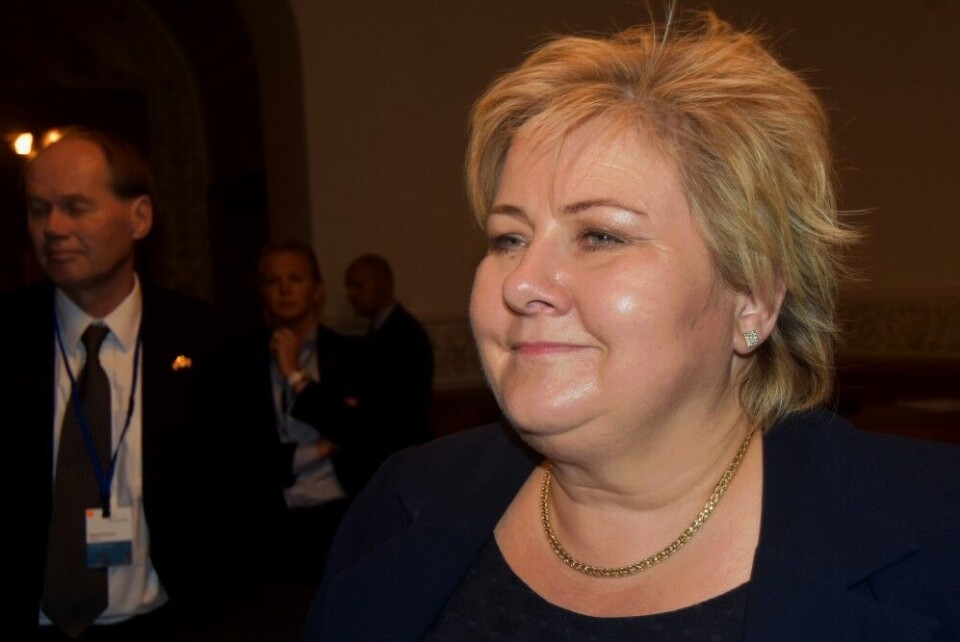
Solberg congratulates Putin on re-election
Unlike after Russia’s Presidential elections in 2012, the Norwegian Government is now silent about the way the election was conducted.
Norway emphasizes a “good and constructive relation” with Russia, Prime Minister Erna Solberg writes in her formal congratulation, which opens with “Dear Vladimir Vladimirovich Putin.”
“Our two countries have developed a comprehensive cooperation and wide contact in several important areas,” Solberg writes and says her government looks forward to a continued good cooperation and contact with Russia in areas of common interest.
The relatively low-profiled and friendly letter comes in contrast to the concerns expressed by Norway when Putin shifted office with Dmitry Medvedev and won the elections in 2012. Norway’s Foreign Minister then issued a press-release expressing concerns about what international observers said was “serious shortcomings in the way the election was conducted.” Foreign Minister at the time, Jonas Gahr Støre, said Norway “encourage the Russian leadership to focus more on developing the rule of law and democracy and promoting human rights.”
The only published statement from the Foreign Ministry in Oslo following the presidential elections 2018 in a short tweet about Crimea.
European leaders are divided in reactions to Putin’s re-elections. While Norway and Finland have sent congratulations letters, Sweden and Denmark are so far not listed on Kremlin’s own bragging list of international congratulations to Vladimir Putin.
Sweden’s Foreign Minister Margot Wallström says in a tweet the presidential elections was “uneven playing field, lack of genuine competition and pressure on critical voices.” Like Norway, Sweden also condemns holding of elections in illegally occupied Crimea.
Observing the elections, the Organization for Security and Co-operation in Europe (OSCE) says it was “well administered, but characterized by restrictions on fundamental freedom.”
“…where the legal framework restricts many fundamental freedoms and the outcome is not in doubt, elections almost lose their purpose – empowering people to choose their leaders,” Special Co-ordinator of the OSCE observer mission Michael Georg Links says.
Trying to repair its relations with Russia, Norway sent its Foreign Minister to northern Russia three times last year. After showing Moscow a cold shoulder since the annexation of Crimea in 2014, Minister Børge Brende in 2017 participated at the Arctic Forum in Arkhangelsk in March, as well as the Barents Council meeting in October. Additionally, Brende was present when the first load of highly radioactive spent fuel elements was shipped out of the Cold War nuclear dump storage in Andreeva Bay in June.
Communication Advisor with the Foreign Ministry in Oslo, Ane Haavardsdatter Lunde, is circumspect when asked by the Barents Observer about any Norwegian ministers planning to visit Russia this year.
“Several political visits to and from Russia are under planning for the current year, but no final dates are yet set due of the Russian Presidential elections.”
For Russia, a self-imposed dilemma is the up-coming World Cup where Norway’s Minister of Culture, also responsible for sports, officially are banned entry to Russia.
Minister Trine Skei Grande is listed on Russia’s stop-list, a response to Norway following EU’s sanctions list of Russian and Ukrainian individuals not allowed entry. Norway has also made it clear to Russia that people on it’s sanctions list are not wanted on Svalbard, a move strongly criticized by Moscow claiming it violates the intentions of the Svalbard Treaty.
State Secretary Jan-Christian Kolstø in the Ministry of Culture says to the Barents Observer that the minister is not planning to go to Russia for the for the champingship as Norway did not qualify for the football World Cup.
Both Sweden and Iceland are considering not sending officials to the World Cup in Russia this summer in support of the United Kingdom’s partial boycott following the nerve agent attack on double agent Sergey Skripal and his daughter in England earlier this winter.
The official opening ceremony for the tournament takes place in Moscow on June 14.
We depend on your help to continue factbased, fearless and free journalism in the borderland to Russia in the north. Support the Barents
















